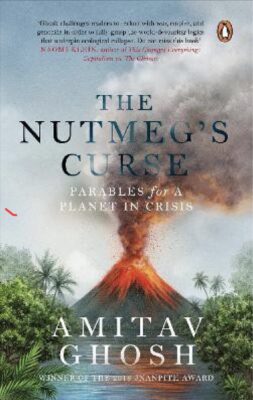
Amitav Ghosh’s The Nutmeg’s Curse traces the nutmeg’s violent trajectory from being a modest local spice to a prized commodity setting off a frenzied race among the colonial powers for control of the islands on which it grew. Laden with facts sourced from historical accounts, research articles and scientific journals, it is an apt successor to his earlier book, The Great Derangement, and carries forward the theme of climate crisis around a seemingly tiny, but nevertheless, a priceless nut. As the blurb itself declares, the book is about a planet in crisis, a planet that is on the verge of ecological collapse.
Ghosh’s aim in writing The Nutmeg’s Curse appears to be to challenge the prevailing paradigm of thinking and shake its foundations with a view to push the readers out of their comfort zones. He demolishes commonly held notions of the climate crisis – in particular the prevailing view that it started with the use of coal, and was aggravated by the abundant use of oil and gas in the 20th century. He traces its roots far deeper in history, in particular to the rapacious tendencies of the western colonisers who, in a bid to exploit natural resources and human labour, traversed to the farthest extremities of the world.
In the eyes of the Dutch colonists, there was no connection between the Bandanese and the landscape they inhabited because their sole aim was to transform the islands into a nutmeg-producing factory. They perpetrated a bloody massacre on the Bandanese in 1621 in order to depopulate the island of its original inhabitants and monopolise the cultivation and trade of a tree of incomparable value that was gifted to the islanders by the region’s volcanic ecology. While the Portuguese may have been the first to reach the Banda Islands in search of nutmeg, it was already available across Europe, though at prohibitively high prices. The complexity of the trade, the multiplicity of the middlemen involved, its unique flavour, and the purported medicinal properties made it such a sought-after commodity.
In the chapter titled “Terraforming”, Ghosh talks about one of the key traits of the colonists – their habit of erasing the original name and meaning of the conquered landscapes by renaming them. It is similar to what the Puritans did after they exterminated the Pequot – they tried to put to an end their remembrance from the earth by erasing the tribe’s name. This renaming is not only horrendous but is also imbued with semantic and symbolic violence. The Banda massacre had a pattern that was reminiscent of the colonial exterminations, which involved the destruction of such crucial elements as forests and animals that sustain life.
Man’s insatiable lust for control and his innate exploitative tendencies have had terrible consequences for the planet, often manifesting in extreme weather events such as droughts and floods, heatwaves, etc. The current pandemic is the latest in a series of catastrophes that have resulted from our troubled relationship with the earth over the past few centuries. The use of the word ‘curse’ in the title of the book is a reminder that Gaia has had enough and cannot remain a mute spectator to man’s utter disregard of the sanctity of the earth.
The Nutmeg’s Curse primarily focuses on the greed the colonial powers displayed so blatantly in dealing with the earth and the people, but the modern superpowers (developing nations are equally to blame) are no less greedy when it comes to oil, minerals and other natural resources. Multinational companies use their clout in sabotaging any environment-friendly measure/effort if it goes against their vested interests.
Talking about the vulnerabilities, The Nutmeg’s Curse tries to debunk the assumption that the West, with its robust GDP and superior infrastructure, will remain immune to the various planetary crises that are likely to impact the world in future. These assumptions look plausible but the recent pandemic and the ravages it left in its trail in the advanced countries has demolished the myth of the West’s invulnerability. Though there may not be any direct link between climate change and the pandemic, the outbreak of infectious diseases is the hidden cost of bad economic-development model, improper land use, human intrusion into wildlife habitat, consumer culture and other related missteps of the homo sapiens.
After having established himself as one of the major creative writers of the modern era, Ghosh has evolved into a sort of climate activist in recent years. He uses his linguistic competence to highlight his concerns, relating primarily to ecological catastrophe through his books, articles, interviews, lectures, panel discussions, etc. However, in spite of his deep and consistent involvement in these complex and alarming issues that have pushed the planet into the red zone, he doesn’t come out as a doomsday prophet. He is of the view that it is possible to save the planet if we adopt alternative models of development and living. Written in scintillating prose, The Nutmeg’s Curse offers profound insights into the planetary crises. The policymakers would do well if they used it as a reference book for policy-making for a happier, peaceful, and stable world.

Praveen Kumar
Praveen Kumar taught English language and literature in Himachal Pradesh for close to 30 years, and retired as Principal of Govt. College, Sarahan. The co-editor of two anthologies, ‘The Threshold’ ‘and ‘Let Us Tell a Story’, he writes poetry, both in Hindi and English, short pieces on literature and topics of general interest. Presently, the coordinator of English Teachers’ Forum, Himachal Pradesh, he also runs a podcast named The Joy of Ideas.
